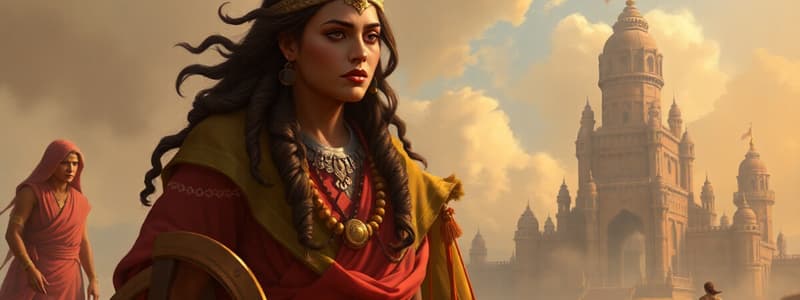Podcast
Questions and Answers
What language family does Odia belong to?
What language family does Odia belong to?
- Dravidian
- Indo-European
- Indo-Aryan (correct)
- Sino-Tibetan
Which is a notable feature of English grammar?
Which is a notable feature of English grammar?
- Verb-Subject-Object structure
- Subject-Verb-Object structure (correct)
- Pronoun-Verb-Subject structure
- Noun-Adjective-Verb structure
What does sovereignty refer to in political science?
What does sovereignty refer to in political science?
- Legitimate power recognized by society
- Supreme authority within a territory (correct)
- National power held by a leader
- Right of citizens to vote
Which of the following languages uses the Odia script?
Which of the following languages uses the Odia script?
Which historical period is characterized by the rise of empires and feudalism?
Which historical period is characterized by the rise of empires and feudalism?
Who is a notable poet in the Odia literary tradition?
Who is a notable poet in the Odia literary tradition?
Which branch of political science focuses on interactions between states?
Which branch of political science focuses on interactions between states?
What is a key concept in logic that indicates an argument must logically follow from its premises?
What is a key concept in logic that indicates an argument must logically follow from its premises?
Flashcards are hidden until you start studying
Study Notes
Odia
- Language Family: Indo-Aryan, part of the Eastern group.
- Script: Odia script, derived from Brahmi.
- Literature: Rich literary tradition; notable poets include Jagannath Das and Surendra Mohanty.
- Cultural Significance: Official language of Odisha; used in government, education, and media.
English
- Language Family: Germanic, part of the West Germanic group.
- Global Use: Widely spoken as a first and second language; a global lingua franca.
- Literature: Diverse; includes works of Shakespeare, Dickens, and modern authors.
- Grammar: Subject-Verb-Object structure; complex tense system.
History
- Definition: Study of past events, particularly in human affairs.
- Key Periods:
- Ancient History: Civilizations like Mesopotamia, Egypt, Indus Valley.
- Medieval History: Feudalism, the rise of empires, and religious movements.
- Modern History: Industrial Revolution, World Wars, and globalization.
- Importance: Understanding societal development, cultural evolution, and political changes.
Political Science
- Definition: Study of politics, government systems, and political behavior.
- Key Concepts:
- Power: The ability to influence or control.
- Authority: Legitimate power recognized by society.
- Sovereignty: Supreme authority within a territory.
- Branches:
- Comparative Politics: Study of different political systems.
- International Relations: Focus on interactions between states.
- Political Theory: Philosophical foundations of politics.
Logic
- Definition: Study of reasoning and argument structure.
- Types of Logic:
- Formal Logic: Uses symbols and formulas to represent arguments.
- Informal Logic: Focuses on everyday reasoning and argumentation.
- Key Concepts:
- Argument: Composed of premises and a conclusion.
- Validity: An argument is valid if the conclusion logically follows from the premises.
- Soundness: A valid argument with true premises.
Optional Sanskrit
- Language Family: Indo-Aryan, historical language of India.
- Script: Devanagari and other regional scripts.
- Literature: Includes Vedas, Upanishads, epics like Mahabharata and Ramayana.
- Cultural Significance: Important for understanding Hindu philosophy, rituals, and classical texts.
Odia
- Indo-Aryan language, classified under the Eastern group.
- Utilizes the Odia script, which evolved from Brahmi script.
- Boasts a rich literary heritage; key poets include Jagannath Das and Surendra Mohanty.
- Serves as the official language of Odisha, playing a vital role in government, education, and media sectors.
English
- Part of the Germanic language family, specifically West Germanic.
- Recognized as a global lingua franca, extensively spoken as both a first and second language.
- Features a diverse literary history, encompassing works by Shakespeare, Dickens, and contemporary writers.
- Follows a Subject-Verb-Object structure, with a complex tense system for grammatical construction.
History
- Defined as the exploration of past events, particularly related to human societies.
- Key periods include:
- Ancient History: Emergence of early civilizations such as Mesopotamia, Egypt, and the Indus Valley.
- Medieval History: Notable for feudalism, the establishment of empires, and influential religious movements.
- Modern History: Marked by the Industrial Revolution, two World Wars, and the onset of globalization.
- Essential for comprehending societal progression, cultural transformations, and political dynamics.
Political Science
- Encompasses the examination of politics, government systems, and individual political behavior.
- Key concepts include:
- Power: The capacity to exert influence or control.
- Authority: Power deemed legitimate by societal norms.
- Sovereignty: The ultimate authority within a defined territory.
- Branches of study involve:
- Comparative Politics: Analyzing various political systems across regions.
- International Relations: Investigating relations among nations.
- Political Theory: Exploring the philosophical groundwork of political systems.
Logic
- Focuses on the principles of reasoning and argumentation structure.
- Two main types of logic are:
- Formal Logic: Involves the use of symbols and formulas to depict arguments.
- Informal Logic: Deals with reasoning encountered in everyday situations.
- Key concepts consist of:
- Argument: Consists of premises leading to a conclusion.
- Validity: Achieved when a conclusion logically follows from the presented premises.
- Soundness: Represents a valid argument that contains all true premises.
Optional Sanskrit
- An Indo-Aryan language recognized as one of the historical languages of India.
- Utilizes the Devanagari script along with various regional scripts.
- Rich literary works include the Vedas, Upanishads, and epics like the Mahabharata and Ramayana.
- Holds cultural significance for its influence on Hindu philosophy, rituals, and classical literature.
Studying That Suits You
Use AI to generate personalized quizzes and flashcards to suit your learning preferences.




